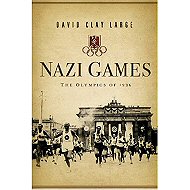|
Nazi Games: The Olympics of 1936
|
|
David Clay Large
|

|

The torch relay - that staple of Olympic pageantry - first opened the summer games in 1936, in Berlin. Proposed by the Nazi Propaganda Ministry, the relay was to carry the symbolism of a new Germany across its route through south-eastern and central Europe. Soon after, the Wehrmacht would march in jackboots over the same terrain.
The Olympic festival in Berlin was the Nazis' first big international show, a crucial part of the regime's domestic and international mobilization. It was also the occasion for dazzling athletic feats, including Jesse Owens's four gold medal performances. But in this Olympics politics could not be separated from performance. The Korean runner Kitei Son set an Olympic record in winning the marathon, the Rising Sun of imperial Japan on his bib.
He dutifully bowed his head as the Japanese anthem was played during the medal ceremony, but he told reporters afterward that he felt only "shame and outrage" over Japan's occupation of Korea. Japanese officials banned Son for life from athletic competition.
Here in a compelling narrative is the full story of the Berlin Olympics: the careful planning and staging of the games by key Nazi party officials, from Carl Diem to Goebbels and Hitler; the international effort to boycott the games, derailed finally by the determination of the American Olympic Committee and its head, Avery Brundage, to participate; the athletes and the competitions, including those of 1936 winter games held in Bavaria; and the memory of the games conveyed in Leni Riefenstahl's film Olympia
David Clay Large tells the story of the Nazi Olympics with insight and flair. He presents the games as a key event in Nazi German history and in the history of the modern Olympics. With the summer games in Beijing in the horizon, Nazi Games carries much resonance today.
David Clay Large, an acclaimed historian of modern Germany, draws here on fresh primary source materials from the International Olympic Committee, the German Olympic Committee, the American Olympic Committee, and other archives. An accomplished athlete, he also ran the marathon course in Berlin, sculled on the Muggelsee where the rowing events were held, and hiked the ski hills above Garmisch-Parten-Kirchen, site of 1936 Winter Olympics. He and his family live in Bozeman, where he teaches at Montana State University, and in San Francisco.
|
|
